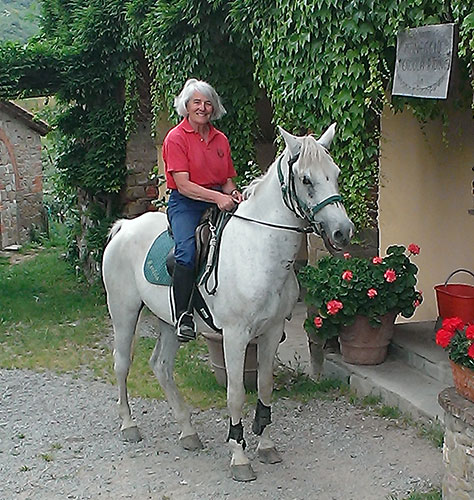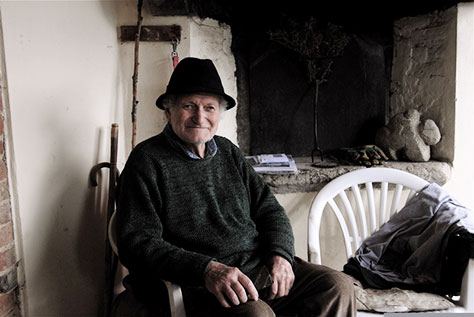
This is Jenny Bawtree, the proper who has an Oxford degree in languages and spent four years teaching English at the University of Florence before founding Rendola Riding in 1969. She set up the riding centre because she wanted to transmit to others her love of riding and the Tuscan countryside. She is very knowledgeable about local history, art and architecture,as well as the flora and fauna.
After running the centre for fifty years she decided to change course and dedicate herself to studying and writing books, leaving the equestrian centre into the hands of Eraldo Tuvèri, instructor and guide in Rendola since 2005. She had already written Pietro’s Book, the story of a Tuscan peasant (Constable and Arcade publishing (2003) and Tuscany on horseback (self-published in 2015). More recently she has written Il Ciclo dei Mesi: da Aosta a Otranto alla scoperta di un tesoro dell’arte medievale italiana (Terra Nuova Edizioni, 2020), which has had excellent reviews. Hopefully there will be an English translation soon. She is now writing a book about Itallian frescoes of the Legend of the True Cross and also the story of a horse, planned to be Italy’s answer to the world-famous story, Black Beauty!
“Jenny, let me say right off, was the best leader of a ride I’ve ever experienced – and my experience of such rides is by now fairly extensive. She was knowledgeable about everything local and Tuscan: the birds, the plants and flowers, the cuisine, the agriculture, the history, the art and so on. One of our number was a cyclist and went on her own excursions that were mapped out for her in advance. The fact that Jenny are her staff could make a non-rider comfortable says a lot for the fact that the whole place is geared to making any guest’s time there very special and memorable… Jenny shaped the way in which I enjoyed my first encounter with Italy and I feel great gratitude to her.”
– Margaret Edwards
“Jenny has a wonderful knowledge of Italian as well as an interest in art history. This resulted in experiences I didn’t expect, such as a seminar in the pronunciation of Italian, fascinating tours of ancient churches and reading recommendations which enhanced the whole experience.”
– Jean Rohland

Eraldo Tuvèri, our instructor, who comes from Sardinia.
He first came to work at Rendola in 1995, and then went to England for ten years, where he qualified as a British Horse Society instructor, so his English is very fluent.
He has more than thirty years experience as guide, he’s an excellent instructor and he’s great fun and good company
“Eraldo is an excellent horseman and guide. He charmed us with his delightful ways and provided many laughs.”
– Linda Giannino
He has been back at Rendola since 2005. He is very knowledgeable about the local fauna and is always happy to talk about it with the guests of the Centre.
Since 2019 he is the manager of Rendola Riding Centro Equestre and responsible for horses and all activities related to horses.
This is Isabella, our cook and referent in management of the house. She’s from Milano but lives in Tuscany since 1984, when she married. She’s not a chef but she loves to cook for her family and even more for our guests, offering them the dishes of the real Italian and Tuscan cuisine. With a great success.
She organizes cooking classes for foreign visitors but even art workshops in Rendola, as pottery painting or botanical print on fabric.

This is Pietro Pinti, although he died in 2011 at age 84, no description of Rendola can omit acknowledging his dedication to the centre over the thirty years that he worked there,
With his cooperation Jenny wrote his life-story, which reveals the hardships but also the joys of farming in Tuscany between the thirties and the seventies. The English version Pietro’s Book was published by Constable in 2003 and the American edition, published by Arcade publishing, came out in 2004 (they also produced an audiobook).The book is still available on Amazon.
“This is a very valuable book, not only for its autobiographical content but also for its evocation of the rural world of the last century.”
– Dante Priore, expert in folk culture




